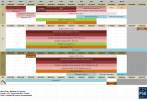PDE CDT Structure
Year 1
The year begins with a three-week foundation module (FM) of four short courses each consisting of a lecturer outlining the key concepts, a problem sheet and follow-up tutorial class where the questions are worked through in detail:
Core courses then cover key aspects of PDEs and their analysis and applications. These courses include: Analysis of PDEs which is a central course consisting of three termly lecture courses consisting of a lecturer outlining the key concepts, regular set problem sheets and follow-up tutorial classes where the questions are worked through in detail. There is a final exam to assess understanding of the key concepts.
Other core themes will be covered in a mix of survey, lecture and reading courses:
The survey courses consist of a set of lectures giving an overview of the subject and touch upon some of the material which will be covered in more detail in the later courses. The lecture courses follow a similar structure to the Analysis of PDE courses. The reading courses usually begin with the lecturer covering a some material and then arrngements being made for students to present on a related paper or some recent research finding.
Students will have access to leading researchers in PDE. Topic courses will be given by a selection of CDT members and invited international experts in leading related topics.
Students also undertake two 10-week research projects in distinct areas to gain interdisciplinary research experience and training. There is a spring retreat and summer school allowing students to present their project findings and undertake crash/short courses in modern research topics.
Skills training sessions are run to help develop a broader set of skills required for career development in both academic and non-academic settings.

Years 2 - 4
Students will conduct research towards their DPhil thesis. In this they will be aided by regular meetings with their supervisor(s) and:
- exchanges and internships with academic and non-academic partners;
- study groups with students having similar interests;
- collaborative workshops and regular seminar series.
Students will also broaden their knowledge through attending further courses and skills training. There is the opportunity to interact with other cohorts at seminars, spring retreats and summers schools.
Throughout the 4 years students also have support from a Cohort Mentor, the CDT Directors and CDT Admininstrator.


